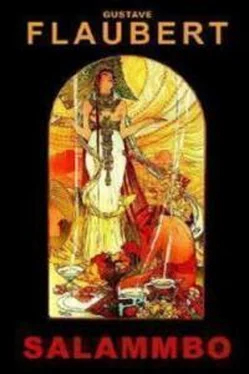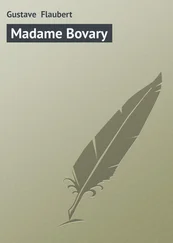A mist heavy and warm, such as comes in those regions at the end of winter, sank on the fourteenth day upon the army. This change of temperature brought numerous deaths with it, and corruption was developed with frightful rapidity in the warm dampness which was kept in by the sides of the mountain. The drizzle that fell upon the corpses softened them, and soon made the plain one broad tract of rottenness. Whitish vapours floated overhead; they pricked the nostrils, penetrated the skin, and troubled the sight; and the Barbarians thought that through the exhalations of the breath they could see the souls of their companions. They were overwhelmed with immense disgust. They wished for nothing more; they preferred to die.
Two days afterwards the weather became fine again, and hunger seized them once more. It seemed to them that their stomachs were being wrenched from them with tongs. Then they rolled about in convulsions, flung handfuls of dust into their mouths, bit their arms, and burst into frantic laughter.
They were still more tormented by thirst, for they had not a drop of water, the leathern bottles having been completely dried up since the ninth day. To cheat their need they applied their tongues to the metal plates on their waist–belts, their ivory pommels, and the steel of their swords. Some former caravan–leaders tightened their waists with ropes. Others sucked a pebble. They drank urine cooled in their brazen helmets.
And they still expected the army from Tunis! The length of time which it took in coming was, according to their conjectures, an assurance of its early arrival. Besides, Matho, who was a brave fellow, would not desert them. "'Twill be to–morrow!" they would say to one another; and then to–morrow would pass.
At the beginning they had offered up prayers and vows, and practised all kinds of incantations. Just now their only feeling to their divinities was one of hatred, and they strove to revenge themselves by believing in them no more.
Men of violent disposition perished first; the Africans held out better than the Gauls. Zarxas lay stretched at full length among the Balearians, his hair over his arm, inert. Spendius found a plant with broad leaves filled abundantly with juice, and after declaring that it was poisonous, so as to keep off the rest, he fed himself upon it.
They were too weak to knock down the flying crows with stones. Sometimes when a gypaetus was perched on a corpse, and had been mangling it for a long time, a man would set himself to crawl towards it with a javelin between his teeth. He would support himself with one hand, and after taking a good aim, throw his weapon. The white–feathered creature, disturbed by the noise, would desist and look about in tranquil fashion like a cormorant on a rock, and would then again thrust in its hideous, yellow beak, while the man, in despair, would fall flat on his face in the dust. Some succeeded in discovering chameleons and serpents. But it was the love of life that kept them alive. They directed their souls to this idea exclusively, and clung to existence by an effort of the will that prolonged it.
The most stoical kept close to one another, seated in a circle here and there, among the dead in the middle of the plain; and wrapped in their cloaks they gave themselves up silently to their sadness.
Those who had been born in towns recalled the resounding streets, the taverns, theatres, baths, and the barbers' shops where there are tales to be heard. Others could once more see country districts at sunset, when the yellow corn waves, and the great oxen ascend the hills again with the ploughshares on their necks. Travellers dreamed of cisterns, hunters of their forests, veterans of battles; and in the somnolence that benumbed them their thoughts jostled one another with the precipitancy and clearness of dreams. Hallucinations came suddenly upon them; they sought for a door in the mountain in order to flee, and tried to pass through it. Others thought that they were sailing in a storm and gave orders for the handling of a ship, or else fell back in terror, perceiving Punic battalions in the clouds. There were some who imagined themselves at a feast, and sang.
Many through a strange mania would repeat the same word or continually make the same gesture. Then when they happened to raise their heads and look at one another they were choked with sobs on discovering the horrible ravages made in their faces. Some had ceased to suffer, and to while away the hours told of the perils which they had escaped.
Death was certain and imminent to all. How many times had they not tried to open up a passage! As to implore terms from the conqueror, by what means could they do so? They did not even know where Hamilcar was.
The wind was blowing from the direction of the ravine. It made the sand flow perpetually in cascades over the portcullis; and the cloaks and hair of the Barbarians were being covered with it as though the earth were rising upon them and desirous of burying them. Nothing stirred; the eternal mountain seemed still higher to them every morning.
Sometimes flights of birds darted past beneath the blue sky in the freedom of the air. The men closed their eyes that they might not see them.
At first they felt a buzzing in their ears, their nails grew black, the cold reached to their breasts; they lay upon their sides and expired without a cry.
On the nineteenth day two thousand Asiatics were dead, with fifteen hundred from the Archipelago, eight thousand from Libya, the youngest of the Mercenaries and whole tribes—in all twenty thousand soldiers, or half of the army.
Autaritus, who had only fifty Gauls left, was going to kill himself in order to put an end to this state of things, when he thought he saw a man on the top of the mountain in front of him.
Owing to his elevation this man did not appear taller than a dwarf. However, Autaritus recognised a shield shaped like a trefoil on his left arm. "A Carthaginian!" he exclaimed, and immediately throughout the plain, before the portcullis and beneath the rocks, all rose. The soldier was walking along the edge of the precipice; the Barbarians gazed at him from below.
Spendius picked up the head of an ox; then having formed a diadem with two belts, he fixed it on the horns at the end of a pole in token of pacific intentions. The Carthaginian disappeared. They waited.
At last in the evening a sword–belt suddenly fell from above like a stone loosened from the cliff. It was made of red leather covered with embroidery, with three diamond stars, and stamped in the centre, it bore the mark of the Great Council: a horse beneath a palm–tree. This was Hamilcar's reply, the safe–conduct that he sent them.
They had nothing to fear; any change of fortune brought with it the end of their woes. They were moved with extravagant joy, they embraced one another, they wept. Spendius, Autaritus, and Zarxas, four Italiotes, a Negro and two Spartans offered themselves as envoys. They were immediately accepted. They did not know, however, by what means they should get away.
But a cracking sounded in the direction of the rocks; and the most elevated of them, after rocking to and fro, rebounded to the bottom. In fact, if they were immovable on the side of the Barbarians—for it would have been necessary to urge them up an incline plane, and they were, moreover, heaped together owing to the narrowness of the gorge—on the others, on the contrary, it was sufficient to drive against them with violence to make them descend. The Carthaginians pushed them, and at daybreak they projected into the plain like the steps of an immense ruined staircase.
The Barbarians were still unable to climb them. Ladders were held out for their assistance; all rushed upon them. The discharge of a catapult drove the crowd back; only the Ten were taken away.
Читать дальше









![Гюстав Флобер - Закат Карфагена [Сборник]](/books/414440/gyustav-flober-zakat-karfagena-sbornik-thumb.webp)
